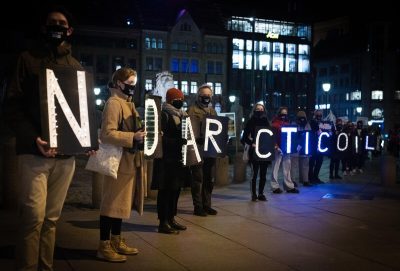A lengthy legal battle over whether Norway can continue to license oil operations in the Arctic reached the country’s highest court on Wednesday. If the court agrees that Norway has violated its own constitution by issuing licenses for oil industry activity in sensitive Arctic areas, all new oil exploration and production in the Barents Sea can be frozen.

It was a victory in itself for the four climate- and environmental organizations suing the government when Norway’s Supreme Court (Høyesterett) agreed to hear their appeal. They’d lost at both the local and state levels but now the country’s highest court is hearing their arguments that Norway’s Oil & Energy Ministry has violated the constitution’s Paragraph 112 by issuing exploration licenses in the Barents.
The paragraph maintains, in short, that everyone has a right to a safe and healthy environment. That includes an environment that secures human health and ensures that natural diversity and sustainability is protected. Natural resources are supposed to be managed from a long-term perspective, and the safety and health rights of future generations of Norwegians are to be protected, too.
That prompted Natur og Ungdom (Young Friends of the Earth) and Greenpeace Nordic to sue the Norwegian state in 2016, after the government and its Oil & Energy Ministry opened new Arctic oil fields in the Barents Sea in its 23rd licensing round. More exploration licenses have been issued since, sparking protests that such petroleum activity will damage the environment, threaten sealife, generate more carbon emissions and threaten efforts to halt climate change.
Two other organizations, The Grandparents’ Climate Campaign and Friends of the Earth Norway (Naturvernforbund), later joined the lawsuit as intervenors, with all the plaintiffs backed by long lists of supporters from academia, the arts, political parties and climate researchers. Oil drilling and production in the Arctic remains highly controversial, and now it’s increasingly viewed as financially risky as well. Given the steep decline in oil prices in recent years, even some oil majors have pulled out of the Arctic because of the high costs and environmental risk involved.

It’s the threat posed by oil and gas activity to the climate and environment that’s of most concern. The high court must now evalute the validity of exploration and production licenses granted to oil companies including Norway’s own Equinor. The court will need to decide whether the licenses violate Paragraph 112 of the Constitution and whether the decision to open up new offshore areas of Norway’s portion of the Barents Sea was based on inadequate environmental impact reports.
If the court decides in favour of the plaintiffs, only the licenses issued in 10 oil and gas fields during the 23rd licensing round will be directly affected. Law professor Hans Petter Graver at the University of Oslo, however, claims such a decision will have consequences for all Arctic oil activity and halt new oil industry operations in the Barents as well.
“This will be a verdict that will have long-term implications on the intepretation of Paragraph 112 of the Constitution,” Graver told newspaper Klassekampen over the weekend. “If the high court accepts that this was a constitutional violation, it’s difficult to believe that the high court won’t also conclude that the climate is protected by the Constitution.”
That means a ruling that overturns the lower courts’ verdicts “will have very large implications for petroleum policy but also in other areas,” Graver said. He cited a similar case in the Netherlands, in which the Dutch high court ended up setting “clear goals and a framework for climate policy in the country.” Attorneys representing the Norwegian plaintiffs this week also pointed in their opening arguments on Tuesday to successful climate cases in other countries including Great Britain, Ireland and Colombia.

Attorney Cathrine Hambro, representing the plaintiffs, opened the Supreme Court appeal Wednesday by arguing that Norway’s constitution (Grunnloven) holds the state government responsible for hindering danger and security society. She also read aloud from the Paris Agreement that now holds especially wealthy countries like Norway responsible for hindering the global warming that oil activity can accelerate. She asked the high court to determine a national limit to how much climate-unfriendly activity Norway can tolerate. She criticized the lower court’s failure to consider the consequences that global warming will have for Norway.
With oil prices low and poor exploration results so far, the oil industry has begun to lose interest in Arctic exploration. There’s also a debate over the size of potential reserves in the area, and the high cost of extracting any that are found. Proponents of oil activity in the Arctic contend that Norway needs to continue exploiting its natural resources, and that demand for oil and gas will remain high for at least a few more decades.
The state has defended its promotion of oil licenses in the Arctic, mostly as a source of jobs and state revenues for future generations. Defense attorneys for the state have branded the lawsuit as a political gesture that doesn’t belong in the court system. “The state believes the paragraph puts the burden of environmental impact on the authorities, to make decisions that protect the nature,” state attorney Fredrik Sejersted told state broadcaster NRK. As long as those authorities adhere to that obligation, Sejersted argues, they’re not violating the constitution.
Sejersted was reluctant to comment on the case before he’d had his turn to defend the state. He told NRK, however, that “the most important thing from our side will be that the decision to allow oil drilling was made by the King in the Council of State (the monarch’s ceremonial weekly meeting with the government) and was voted on three times in Parliament, with a broad majority behind it. And it’s in line with Norwegian petroleum policy.”
He agrees, however, that if the “People vs Arctic Oil” plaintiffs prevail, it will force major changes in Norwegian petroleum policy. Greenpeace Norway leader Frode Pleym was confident heading into court Tuesday morning, telling reporters that he believes Norway’s Supreme Court “will find these oil licenses in the Barents to be in violaton of the constitution.”
The court case is due to run from November 4-12 at the Supreme Court in Oslo. It’s being conducted digitally, however, with only plaintiffs and a limited press corps in the courthouse, while lawyers and the justices are conducting procedures from remote locations via video links in accordance with Corona virus containment measures.
NewsInEnglish.no/Nina Berglund

